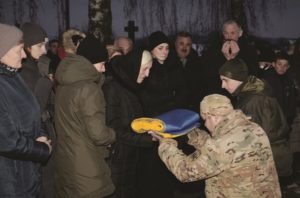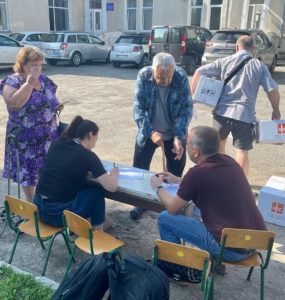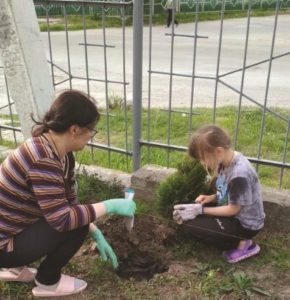When the Independent first spoke with Mayor Bogdan Kelichavyi of Kopychyntsi, a town of about 13,000 in western Ukraine, the Russian invasion was only six days old. It was March 1, 2022, and a wave of refugees had already reached his small town, fleeing the advancing tanks in the north, south, and east of the country.
By May, when this reporter spoke with Mayor Kelichavyi again, the situation had stabilized somewhat. The complex logistics of war had taken over, and the roads from Poland were filled with relief supplies and armaments.
At the one-year anniversary of Russia’s invasion, the Independent caught up with Mayor Kelichavyi again.
The outlook has both brightened and darkened, he said. Kopychyntsi has survived incredible stresses, finding creative ways to light up the darkness of rolling blackouts.
But there have also been funerals. Eight soldiers from the town have died and two are missing out of more than 200 who have been called to fight at the front lines. Three of those eight died in the last month.

“We sent a humanitarian van with provisions to Bakhmut just this week,” Kelichavyi said, referring to a city that Ukraine has been defending for months against a fierce Russian attack. The vans carry food and supplies to soldiers from Kopychyntsi, based on requests they have relayed through their families.
Communication from the front lines is very strong, Kelichavyi said — even after Russia tried to destroy the country’s electric grid at the beginning of winter.
“We lost power for two days in November,” Kelichavyi reported, “and since then, very often it has been six hours off and three hours on, following a schedule.”
That doesn’t mean people are sitting in the dark, though. “People have bought generators, power banks, and special adapters to run wi-fi routers,” Kelichavyi said. “We have a guy who can even recharge mobile phone towers from generators. There’s all these handmade devices and instructions on YouTube. Everybody learned how to calculate watts and volts for all these lights. After this winter, there will never be camping in Ukraine again — only glamping!” the mayor joked.

The town’s hospital had already switched to a wood-fired boiler last summer, Kelichavyi said, in anticipation of possible blackouts. The town hall has a Starlink satellite dish that provides internet when other lines are down. This kind of resilience is manifested nationwide, he said.
“When we are having air raids and drone bombardments and everyone is hiding — these are the biggest fundraisers online for our military,” Kelichavyi said. “We are under alarms, but we still have internet, so there is nothing to do but donate.”
Most of the families who left Kopychyntsi at the beginning of the war have come home, the mayor said, because western Ukraine is relatively safe. There are about 2,000 more people in town than before, however — mostly people who have fled cities near the front lines.
An entire factory that makes furniture for schools moved from the Kharkiv region to Kopychyntsi, he said, bringing 10 employees with them and hiring others locally. A nonprofit from Zaporizhzhia that used to serve people displaced from the 2014 war in Donetsk and Luhansk has now moved its operations there as well.
“The head of our hospital is an internally displaced person from Mariupol, and the head of the education department is displaced from Kherson,” the mayor said. “So, we are mixing and integrating, having a lot of friendship. But our displaced people are still quite vulnerable.”
Almost 30 houses in town have been renovated and now hold displaced people, Kelichavyi said. Because property taxes are so low, it is common in Ukraine for people to simply hold onto unused houses when they move away rather than sell them. “When a family wants a house, they build one on the edge of town,” the mayor said, “and yet we have these abandoned houses inside the town.”
Closer to the front lines, mayors can requisition such houses, but in western Ukraine, Kelichavyi’s team has to negotiate for them. The town has signed 29 deals with property owners allowing displaced people to live in empty houses for free in exchange for upgrades to the properties.

Last May, about 20 people from the city of Kramatorsk had just moved into an old church building in Kopychyntsi and were planting roses there to thank their new neighbors. Kelichavyi confirmed that the refugees and their rose garden were doing well.
“We did a lot of renovations in that building — kitchen and washrooms and just general improvements to the rooms — but they are still there, about 25 people now,” he said. “The roses are growing fine, too. They survived the winter.”
The staff at town hall has been playing nighttime soccer matches against the staff of the relocated factory, Kelichavyi said. They’ve learned how to connect the street lights to generators so they can play when the electricity is out. “We are keeping our normal activities, even with no electricity,” the mayor said.
Light in the darkness isn’t just a metaphor — for Kelichavyi, it’s an act of resistance.
